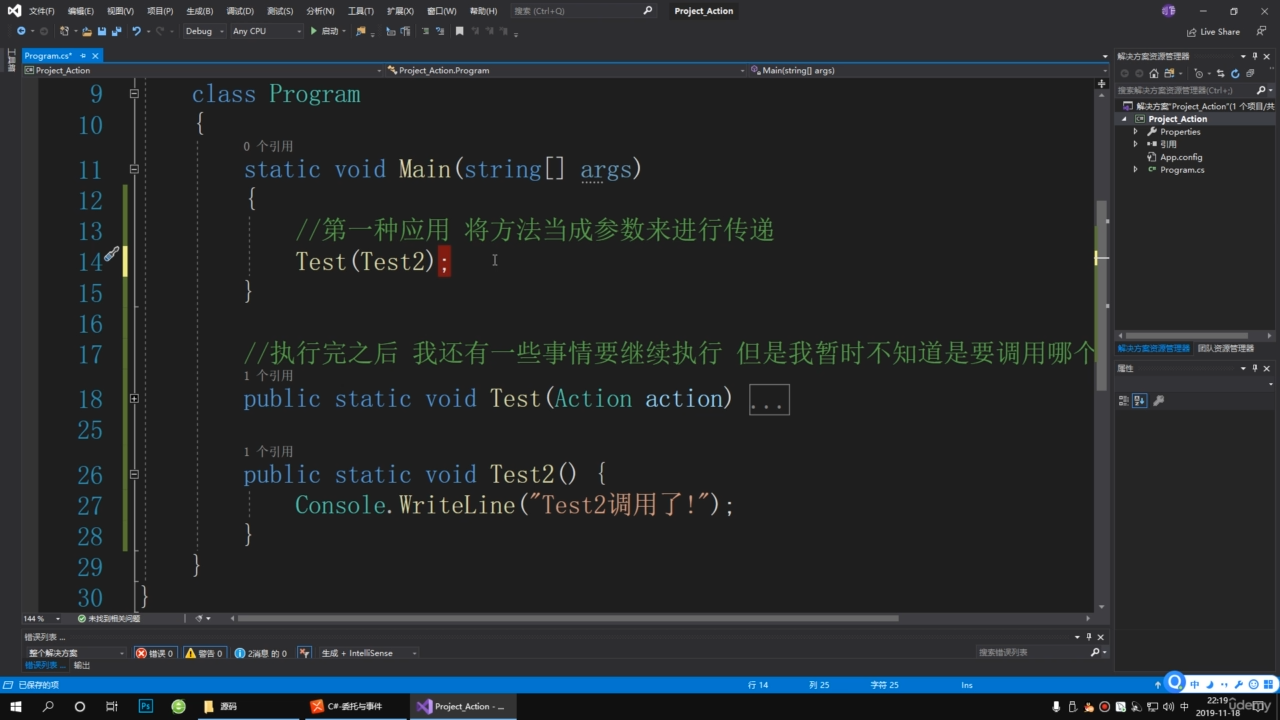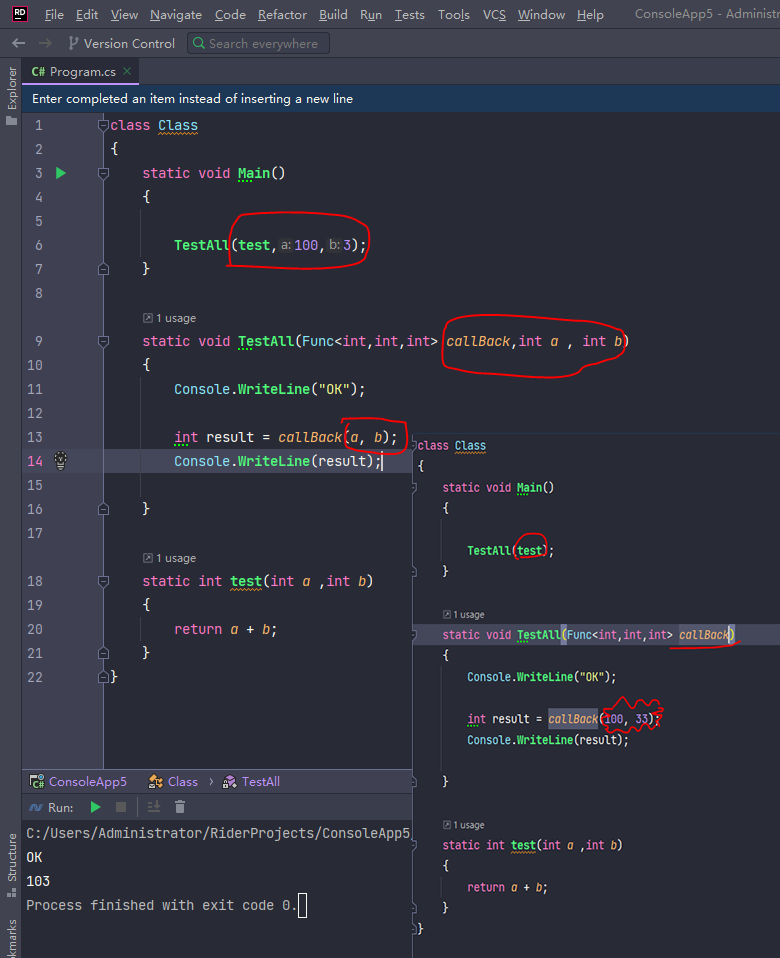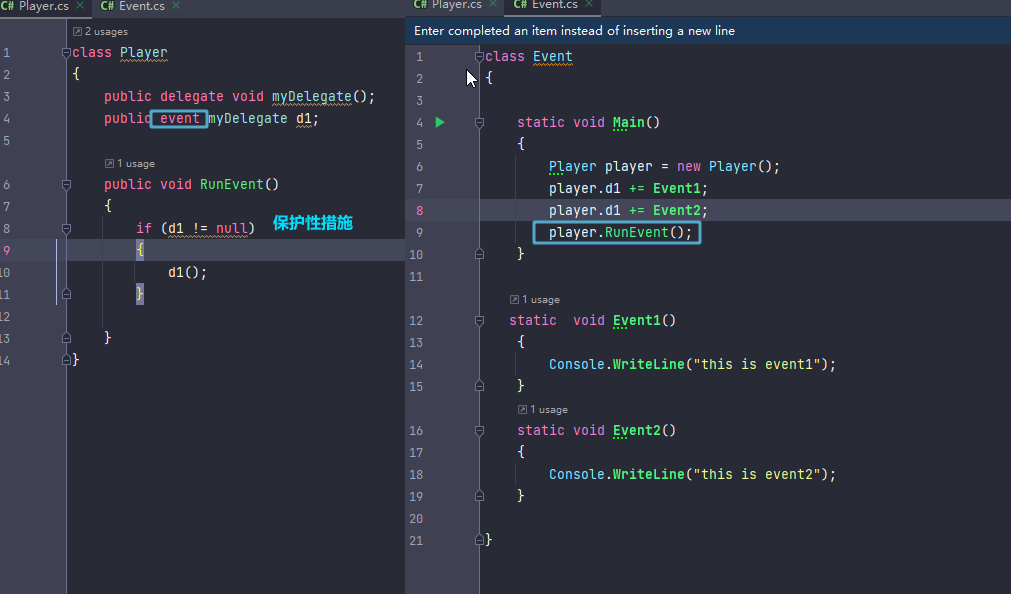🐉
Action委托的使用
在一个函数里面调用另一个函数,只不过这个函数是当作参数传递进来的
先设置一个 Action 类型的变量, 然后将函数存进变量, 然后运行这个变量,效果等同于运行这个函数,当然也可以传进去多个函数,然后在运行那个变量的时候,会一同执行
1 2 3 4 5 6 7 8 9 10 11 12 13 14 15 16 17 18 19 20 21 22 23 24 25 26 27 28 29 30 31 32 33 class Program { static Action function; static Action <string ,int ,int >function2; static void Main () { function2 += PassParameter; function2("result:" ,100 ,33 ); } static void Test1 () { Console.WriteLine("Test1 had been writed 1" ); } static void Test2 () { Console.WriteLine("Test2 had been writed 2" ); } static void PassParameter (string str,int a,int b { Console.WriteLine(str+(a+b)); } }
请留意:Main主函数必须是静态的
Action不支持返回值,于是有了Func
Func 实现带有返回值的委托调用 可以绑定带有返回值的方法 并且接受返回的结果
1 2 3 4 5 6 7 8 9 10 11 12 13 14 15 16 17 18 19 20 21 class Program { static Func<int , int , int > func1; static void Main () { func1 += Test1; int result = func1(100 , 33 ); Console.WriteLine(result); func1 -= Test1; } static int Test1 (int a,int b { return a + b; } }
请留意:如果+=多个值,只会返回最终的一个结果,以上全部覆盖了
Func最多支持16个参数的方法< result , 1 , … , 16?15 >,并且每个方法都有一个返回值
也可以当作参数传递👇
1 2 3 4 5 6 7 8 9 10 11 12 13 14 15 16 17 18 19 20 21 22 class Class { static void Main () { TestAll(test); } static void TestAll (Func<int ,int ,int > callBack ) { Console.WriteLine("OK" ); int result = callBack(100 , 33 ); Console.WriteLine(result); } static int test (int a ,int b { return a + b; } }
如果是想在外部赋值应该在函数testAll参数callBack后 再设置两个参数
古老的委托👉delegate
老师评价:自由 但初学者觉得语法怪
我の评价:这不都是一样的么
1 2 3 4 5 6 7 8 9 10 11 12 13 14 15 16 17 18 19 20 21 22 23 24 25 26 27 28 29 30 31 class Class { delegate void Delegate () private static Delegate delegate1; static void Main () { delegate1 += test1; delegate1 += test2; delegate1(); Console.WriteLine("-------------------------------------" ); delegate1 -= test1; delegate1(); } static void test1 () { Console.WriteLine("this test 1" ); } static void test2 () { Console.WriteLine("this test 2" ); } }
delegate 当作参数传入的例子
就像先声明一个数组,把每个方法存到里面
然后自定义一个函数,形参是个数组,然后调用的时候赋值
这个时候就能把数组内所有的元素都跑一遍
1 2 3 4 5 6 7 8 9 10 11 12 13 14 15 16 17 18 19 20 21 22 23 24 25 26 27 28 29 30 31 32 33 34 35 class Class { delegate void Delegate () static Delegate delegate1; static void Main () { delegate1 += test1; delegate1 += test2; container(delegate1); } static void container (Delegate d ) { Console.WriteLine("tets~~~~~~~~~~~~~~" ); d(); } static void test1 () { Console.WriteLine("this test 1" ); } static void test2 () { Console.WriteLine("this test 2" ); } }
带有参数的
同样也只是计算最后一个函数
1 2 3 4 5 6 7 8 9 10 11 12 13 14 15 16 17 18 19 20 21 22 23 24 25 26 27 28 29 class Class { delegate int Delegate (int a , int b private static Delegate delegate1; static void Main () { delegate1 += test1; delegate1 += test2; int result = delegate1(3 ,4 ) Console.WriteLine(result); } static void container (Delegate d1 ) { Console.WriteLine(d1); } static int test1 (int a , int b { return a + b; } static int test2 (int a , int b { return a * b; } }
留意:若是想打印出所有的方法应该在以下⭐处改动
1 2 3 4 5 6 7 8 9 10 11 12 13 14 15 16 17 18 19 20 21 22 23 24 25 26 27 28 29 30 31 32 33 34 35 class Class { delegate int Delegate (int a , int b private static Delegate delegate1; static void Main () { delegate1 += test1; delegate1 += test2; foreach (Delegate VARIABLE in delegate1.GetInvocationList()) { Console.WriteLine(VARIABLE(4 ,3 )); } } static void container (Delegate d1 ) { Console.WriteLine(d1); } static int test1 (int a , int b { return a + b; } static int test2 (int a , int b { return a * b; } }
Event 实际上是对delegate的封装
在一个脚本对另一个脚本委托的注册
请留意调用的时候
一定要重新写个新函数,如上的RunEvent()
委托和事件的核心作用
解耦各个模块
避免直接去调度其他模块的方法
而是通过注册、移除注册的方式,来控制其他模块方法的调度








